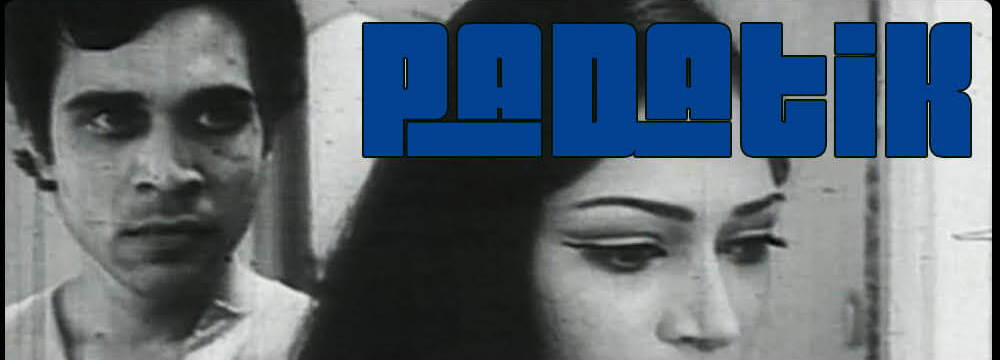Padatik (Mrinal Sen, 1973)

PADATIK
(aka THE FOOT SOLDIER)
dir. Mrinal Sen, 1973
India, 91 min.
In Hindi with English subtitles.
Part of RUINS AND REVOLUTIONARIES: MRINAL SEN
MONDAY MARCH 4 – 7:30 PM
FRIDAY MARCH 15 – 7:30 PM (Q AND A with writer UDAYAN GUPTA)
MONDAY MARCH 25 – 7:30 PM
SUNDAY MARCH 31 – 7:30 PM
PADATIK is the last film in Mrinal Sen’s triptych of Calcutta films, which includes INTERVIEW and CALCUTTA ’71. This film largely takes place within a young woman’s apartment, where a young revolutionary hides from the authorities. Sumit has taken part in a high-profile action and was lucky to escape capture. He spends his days in Shila’s flat reflecting on his own philosophical turmoil, suspicions within the party, and a difficult relationship with his father. Shila (Simi Garewal) works a day job in advertising but also a side project where she interviews local woman on gender inequality. PADATIK balances the tension of the domestic hideout with playful new-wave film gestures, assuring that life is full of beautiful distractions.
One can assume Sumit is a Naxalite, a catchall term used at the time by authorities to describe all revolutionary guerillas and left-wingers. An armed revolt of landless peasants and urban bombings of state offices in the late ‘60s lead to a massive crackdown against supposed agitators. By the early ‘70s, 2,600 people were detained, and many more were murdered in the countryside. Some took to hiding, as is the case in PADATIK. This film shows the complexity of party engagement, struggles with defeatism, and the strain put on family and relationships.
--
MRINAL SEN, director of at least 34 feature films in the Indian state of Bengal, passed away on December 30th at age 95. Critics called his early work the catalyst of the Indian New Wave and he became one of the major figures in Bengali “parallel cinema”. Sen came from a politically active family, and lived through India’s independence, Marxist uprisings and communist rule in Bengal, and the more recent rise of conservative nationalism.
Sen’s films tend to center around ideas and interpersonal exchanges, which expand through a solid cast of actors and carefully shot settings. Sen worked frequently with celebrated cinematographer KK Mahajan, including the three films in this small retrospective. What comes through is a portrait of Calcutta and it’s surrounding region from the relationships within it. Political parties are questioned, middle class values are laid bare, and the ancient past makes an inescapable imprint.

